- Home
- William Kennedy
Quinn's Book Page 10
Quinn's Book Read online
Page 10
“All right? What constitutes all right in this life?”
“Is he well?”
“He’s among the living, if that’s what you’re asking.”
“Then I think I must go.” I said this more to convince myself than anyone else, but I don’t think I succeeded, for Joseph Moran spoke up.
“Is there trouble? You look worried.”
“Not at all,” I said. “Nothing to be afraid of.”
“Then we’ll meet here in the morning.”
“Ten o’clock,” I said, and went out with the man.
He was the driver of an open carriage drawn by two horses, and I rode alone beside him, staring out at the dismally gray afternoon, seeing the houses move farther and farther apart as we left the city. The trees were in early leaf and the grass was as green as April can make it. We’d had a week of heavy rain and the overcast sky threatened us today as well. We turned off the main highway and onto a narrow dirt road, rutted with mud but navigable with the help of the two animals. Certain wooded landscapes in the distance seemed familiar to me, and then I realized we were nearing the Plum spread. I asked the driver, “Are we going to the Plums’?”
He did not answer. I asked a second time, and a second time won no response. At the road leading into the Plum place the driver stopped. I chose not to move. He was a stringy man of anxious mien, a jittery presence inside his scruffy clothing.
“Up there you go,” he said impatiently, pointing over his shoulder with his right thumb. “In the barn, they said.”
“What’s in the barn?”
“Your friend Staats.”
“Then why don’t we drive to the barn?”
“I go no farther than this,” he said, brushing his lapels with the backs of his fingers. I saw no alternative but to climb down. I stood beside the carriage and looked to the barn, then again to him.
“You’ll wait here for me,” I said.
“I go no farther than this,” he said, and he again brushed his lapels.
I walked toward the barn, looking for signs of Plum people, but saw no one; nor did I see any Plum animals. The horses were gone from the corral, and no cows grazed on the hillside. The barn door stood open, as it had when Will and I last visited. I looked back at the carriage and saw the driver still on his perch, holding the reins, looking straight ahead. I entered the barn cautiously, hearing no sound. I surveyed the interior from one step inside the door, discovering an open area for carriages and wagons, a hayloft, and two dozen animal stalls. I saw no sign of Dirck, and so stepped forward, making silent inquiry to the Deity whether in the next instant I would be exploded by a shotgun blast or impaled on the prongs of a rusty pitchfork.
I found Dirck in the farthermost stall, face down in soiled hay, wearing the same ill-fitting clothes he’d been wearing when abducted. On close look it was not animal droppings but his own blood that had soiled the hay. I rolled him over to see his face and found it a total wound, a horrifying smear of blood, gash, and swelling. His eyes told me he was still alive, but not for long, I judged. I did not know how to help him, but my instinct was to clean his face, find his bleeding and stop it, just as I had aided John the Brawn in conserving what remained of his blood after a street fight.
Dirck gave me recognition with his eyes, then closed them. I thought he’d died but he hadn’t; and on he breathed. I lifted him, found he had no power to stand alone and that I was of insufficient strength to carry him. I ran to the door to call the carriage driver and found the low buzzard had driven off. I felt sure now that no one remained on the Plum place except myself and the bleeding Dirck. I spied a pump near the house, a bucket beside it. I filled the bucket, which leaked, and so ran with it to Dirck. I soaked my shirttail to wash the blood from his face, saw his lower lip was split open at the left corner, and his mouth full of partly clotted blood. I blotted and cleaned what I could, fearful of disturbing any clot, and Dirck made no move except to breathe. It appeared he’d been smashed in the face, so swollen was he. After the cleansing I could see his blood flow was mostly stanched, perhaps by time, or by the downward pressure of his wound onto the straw; and that gave rise to small hope in me. He was, nevertheless, all but dead, and would surely die with thoroughness if I did not find help. What I needed was a horse and wagon, and the Plum barn offered neither. I ran to the house, went ’round it to see what was behind, but found nothing. I peered in a window and saw the house had been emptied of furniture, and I began to understand not only how deeply the Plums had been involved in, but also how radically their lives had been changed by, the events set into motion by Dirck.
Beyond the outhouse I saw a shed that probably once held pigs, or possibly chickens, or both, and I went toward it with renewed trepidation, but also thinking I should run for help, find someone with a wagon. But run where? Find whom? The Plum house was near nothing and no one. Will Canaday’s house was miles away. Emmett Daugherty was perhaps a bit closer, but of that I was uncertain. Would either of them be home? How long would it take to run those miles? And what if . . . ?
The chicken-pig house door was open and I entered through it into a black dream, finding a man lying spread-eagled on the floor, a railroad spike driven into each of his hands, each of his feet. He was long dead and much of him was absent, but his red hair, his muttonchops, and his ear partially sliced or bitten away identified him to me as the man who had stolen Dirck’s ledgers from Will’s office. He had been stripped to below the waist, slit up the middle, and now a globular rat was eating his liver. When I came in, the rat scurried off, then paused near an exit hole to observe me, waiting for me to decide whether he should, or should not, be allowed to resume his gluttony.
I am impressed by the practicality of the human mind, even in times of terror. I do not join with those who see terror superseding all other emotions, for what I did at this moment was to cast my glance dutifully about the henhouse and discover a four-sided barrow with wheel and handles: a vehicle. Sent. I glanced anew at the sliced man to reassure myself it was he, to convince myself that he had indeed been crucified and split and was now rat-ridden, proving it to my incredulous eye so I would not later think I had merely imagined it. Then I lunged toward the barrow with sufficiently broad gesture to scare the rat into his exit hole, and I wheeled my vehicle out the door and toward the livid lump that Dirck Staats had become.
Dirck had not moved, but his eyes were open when I arrived.
“Can you move at all? Can you stand?”
He tried valiantly to sit up, but his pain had stupefied him, and he fell back. I heaped straw into the barrow as a cushion for him, then lifted him so he was sitting in the barrow’s center. His legs dangled and touched the ground, making it impossible to wheel him. I found a filthy tethering rope in one stall, wrapped it ’round Dirck’s ankles, and then pulled it taut and fastened it to the barrow’s handles, thus lifting his legs and pointing them straight ahead. I wrapped the rest of the rope around his arms and torso and secured that also to the handles, making him my somewhat upright prisoner. His head was bouncing up, down, and sideward, but that seemed to me irrelevant to his safe passage.
I wheeled him out of the barn and off Plum land, then went a mile at least before I saw another dwelling, high on a hillside. I left Dirck on the road, climbed the hill and knocked at the door. A bearded old man leaning on half a crutch answered.
“What is it, boy?”
“An injured man,” I said, “very badly hurt and bleeding. I have him tied up in that barrow down there. Could I borrow a horse or wagon, or could you take me to get help?”
“What kind of thing is that, tying up a sick man in a barrow?”
“It’s all there was, and I couldn’t carry him, or even lift him. Is there a doctor near here?”
“No doctor’d put a sick man in a barrow.”
“You don’t understand. I’m trying to help him. He’ll die if he doesn’t get help.”
“Whatever ails him, that barrow’ll make him worse. Who is he?”<
br />
“His name is Dirck Staats.”
“Never heard of him.”
“That doesn’t matter,” I said with maximum exasperation. “Can you help him?”
“Where’d you get him?”
“About a mile up the road. In a barn.”
“The Plums’?”
“It used to be their place but they’re all gone now.”
“Plums are gone? Where’d they go?”
“I don’t know. Can you please, please, help us?”
“I wouldn’t help a Plum if he was dyin’ on my doorstep.”
“He’s not a Plum!” I yelled. “His name is Dirck Staats! The Plums are the ones who hurt him!”
“Why’d they hurt him?”
“I don’t know! I don’t know!”
“I wouldn’t help a Plum if he was dyin’ in my barn. If a Plum got kicked by a horse right in front of me I’d let him lay. If a Plum was being pecked to death by woodpeckers I’d buy a ticket and watch.”
Then he closed the door on me.
I wheeled Dirck toward the main road, another half mile at least, some of it uphill and much of it through mud. I often had to go off the road into a field to get past the mud, and climbing crisscross on a hill, I almost lost Dirck overboard twice, his head bobbing like a dead chicken’s.
When I got to the highway I waved down two carriages, but they both kept on. A man carrying a sack of flour on his shoulder stopped to look at Dirck, then went on his way without a word. I sensed Dirck was giving forth an efflux of dread to all who came near him, and felt also that the Christian virtues of charity and compassion were little heeded by my neighbors.
At the next house I roused only a barking dog. At the next I found a feeble woman, useless to my cause except for her remark that I was near the West Troy Road, and so I knew I could find my way to Emmett Daugherty’s. Fixing on Emmett as my destination seemed superior to the futile beseeching of strangers, and so I pushed our barrow with renewed vigor, trying not to dwell on Dirck’s painful descent into hell. I grew impermeable to all glances, certain that any imagined court of mercy along the way would turn into a waste of Dirck’s diminishing time.
I was not even sure Dirck could still hear me. But if he was alive I knew he’d welcome distraction from his pain and discomfort, and so I talked to him aloud of my meeting with Joseph Moran and of our duet on “Kathleen Mavourneen.” I involved Dirck in my future plans at the newspaper and said I hoped he would tutor me in the writing arts. I told him I was grateful beyond measure for this chance to help him, especially after being allowed to live in his own house with his mother, to whom I was growing very close, and as well to Will Canaday, who, through his newspaper and his tutelage, was opening my eyes to the world in ways not accessible to the being I used to be. I gave thanks to Dirck himself for his revelation to me of the significance of the word, which, I could now see, releases boundless emotion and mystery, even into the lives of such folk as the Plums. I did not mention the fate of the sliced man. I focused on Dirck as someone who could change the world with his writing: a maestro of language, a champion of the heroic sentence. Of course I said these things in my limited way, and Dirck had no choice but to accept them in that form.
I ended my monologue wondering silently whether I should tell Dirck about my love for Maud, and my loss of her, but then we were at Main Street, entering into the most easeful steps of my life: that short walk down the sloping grade to Emmett’s house. I saw Emmett sitting on his front step as I turned the corner. He was smoking his pipe, and when I saw smoke rise from it, I knew salvation.
“We’re here, Dirck,” I said, and I almost broke into laughter, for he raised his head and blinked vitally at me.
Quickly now I sharpen my point. We put Dirck to bed in fresh nightclothes, washed him, made him warm. When Josie saw Dirck’s condition she blessed herself, said a silent prayer, and went to a cupboard for a ball of string. With a length of it she took Dirck’s measure from scalp to toe, cut the string, then went to the yard, dug a hole, and buried it.
“They’ll not now take his soul,” she told us.
Emmett sent Josie for the doctor and gave Dirck a warm spoonful of the chicken soup Josie had made. Dirck ejected it violently, at the same time loosening a ball of coagulated blood and straw that had settled in the front of his mouth. Emmett moved the oil lamp close to Dirck’s face to study his wound, and when he turned to me, his eyes were afloat in tears.
“The cruel, cruel bastards,” he said. “They took his one and only tongue.”
THE Albany Chronicle, as we had known it, failed of business one month after Dirck’s return to the human race. Four attempts to set the premises ablaze were foiled, but nighttime vandals finally overpowered our sentinels and destroyed Will’s press with aggravated sledgings. Within one week Will was printing at the shop that published The Paddle, a penny-awful sheet of scandal and mayhem from around the globe (the terrible fate of eunuchs in a Persian harem, the Mouth Murders by the mad dentist of Baltimore); but by then The Society’s many members had withdrawn their paid notices. Even advertisers loyal to Will, finding themselves threatened, withdrew also. Will pressed on with his waning capital, being but a week from closing when Hillegond bought out The Paddle and installed Will as editor. Will merged the publications, fusing the inherited mayhem with his own politics, and naming the new publication the Chronicle-Paddle, a grotesque and short-lived fusion. Will kept it long enough to ensure an orderly transition of readers, but then diminished the word Paddle to minuscularity and, after a year, banished it altogether.
Dirck recovered his health but found his tongueless words no more than idiot grunts; and so he went silent. Because he believed I had saved his life (actually, he might have survived alone, even in the filthy hay—unlike Maud, who required my intercession to remain among the quick), Dirck made me his intermediary. He would scrawl swift messages with his everpointed pencil, then thrust the scrawls at me to read aloud. He wrote of his ordeals in fragments that belied their own truth: “Held me in wonderful chicken coop . . . The gentle Jeremiah Plum took orders from kindly bass-voiced stranger who visited me wearing black veil on his face . . . Unfortunate man with partial ear guarded me with kindness . . . I nevertheless felt selfish need to loosen ropes to escape and return to work at Chronicle . . . Hid in barn, too weak to run . . . Surely against his wishes, Aaron Plum smashed my face with plank and severed my tongue while holding it with pincers . . . Man with veil cautioned Aaron not to kill me while severing tongue . . . My father, wondrous man, saved my life.”
This euphoric response to Plum captivity and torture was peculiar indeed. Will viewed Dirck’s behavior as akin to that of the Christian martyrs who found in all horrors the glorification of that which was greater than themselves: vileness is beauty, punishment is reward, death is life. I saw this equation then, and I see it still, as crackbrained. Dirck’s remark about his father was the most peculiar of all, for Petrus Staats had died in 1835, fifteen years before these events took place.
Petrus entered my life indirectly upon the arrival at the mansion of Lyman Fitzgibbon, the merchant-scientist. He was the godfather of Dirck, the former business partner of Petrus, and an inventor of infinite and ingenious improvements on metal-working machines. He was also the father of Gordon Hamilton Fitzgibbon, who would become one of the most confounding figures in my life, an ambivalent man of prodigious energy and erudition, also a writer of sorts, who on this night was away at law school in Yale College.
I was in the foyer when Lyman rapped with the knocker. I opened the door to see this tall and muscular man with a full white beard, full head of white hair, and beside him his handsome wife, Emily, in a long gown of black satin.
“Who are we here?” the man inquired of me.
“We are Daniel Quinn, sir, and we live here through the kindness of Mrs. Staats. May I announce you to her?”
“A quick tongue on you, boy. I like that. Tell Hillegond Lyman has come back.”
He ha
d returned from Washington, where in recent years he had been serving in an English diplomatic post. London-born, Oxford-educated, Lyman Fitzgibbon had come to America at the age of twenty-six, met and married the wealthy Emily Taylor (her wealth came from shipping), and swiftly joined his wife’s wealth with Petrus in the nailworks that would become an ironworks and then the largest stove-making foundry in the city. Lyman became an investor in banks, insurance, railroads, and assorted commerce as far west as Buffalo and, not least, a land speculator of grand proportion, the speculation generally in service of a commercial enterprise higher than itself. He would, by the mature decades of his life, be Albany’s richest man, his vaunted power, when coupled to nothing more than resolute silence, capable of turning men of perfectly sound ego into cringing and snivelous whelps.
I led the Fitzgibbons to the east parlor to await Hillegond’s appearance. Lyman stopped before Dirck’s portrait on the east wall and spoke toward it.
“How is the boy?”
“He’s recovering, but cannot speak,” I said.
“You were his rescuer,” he said, turning to me.
“I helped him in his trouble,” I said.
“You’re quick, and you’re modest. You will go far in this world, young man.”
“I thank you, sir.”
“Don’t thank me. Thank whoever it was taught you to be quick and modest. You’ll shed that modesty in time.”
I nodded, perceiving in myself not modesty but inadequacy, and wondering with what one replaced modesty, once shed. I found Dirck and told him of Lyman’s arrival, and went with him to the east parlor. Lyman embraced Dirck, saying, “You shouldn’t have written that book, son. You know it was wrong.”
Dirck stared at Lyman, neither contradicting nor agreeing. The knocker sounded again, and Capricorn this time admitted Will Canaday and his ladylove, the handsome widow woman Felicity Baker, a teacher of needlework and deportment at the Albany Female Academy. Our spate of visitors on this evening had been summoned to a musical soiree through which Hillegond hoped to buoy the warped and muted spirit of Dirck. Long a benefactress of The Museum, Hillegond had asked Dorf Miller to choose among his current talent and provide us with an hour’s entertainment. Dorf arrived with pianoforte, violin, tambourine, and banjo virtuosi; also with Joseph K. Moran and a young woman I’d not seen before. Dorf introduced her as Heidi Grahn, a songstress late of Sweden, and at the first sight of her, Dirck’s dark mood faded. He separated himself from his godfather and entered into a fury of note writing: “Be sure she stays after performance,” said the first note he thrust at me. “Tell her I am taken with her voice” (she had not yet uttered a note) . . . “Is she married, betrothed? . . . Ask whether she enjoys poetry . . .”

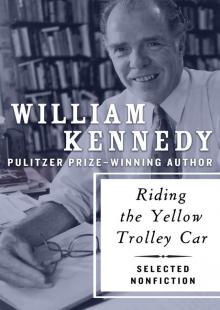 Riding the Yellow Trolley Car: Selected Nonfiction
Riding the Yellow Trolley Car: Selected Nonfiction Changó's Beads and Two-Tone Shoes
Changó's Beads and Two-Tone Shoes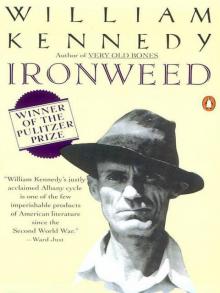 Ironweed
Ironweed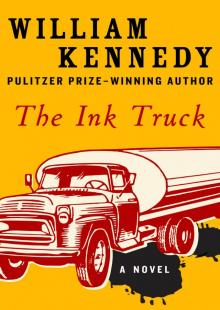 The Ink Truck
The Ink Truck Billy Phelan's Greatest Game
Billy Phelan's Greatest Game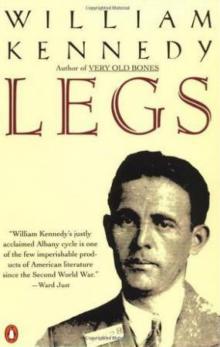 Legs
Legs Very Old Bones
Very Old Bones The Last Mission
The Last Mission The Flaming Corsage
The Flaming Corsage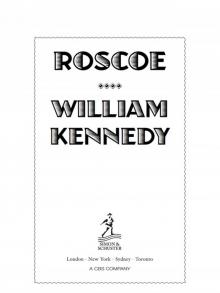 Roscoe
Roscoe Quinn's Book
Quinn's Book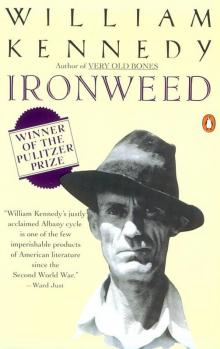 Ironweed (1984 Pulitzer Prize)
Ironweed (1984 Pulitzer Prize)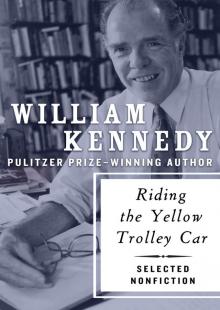 Riding the Yellow Trolley Car
Riding the Yellow Trolley Car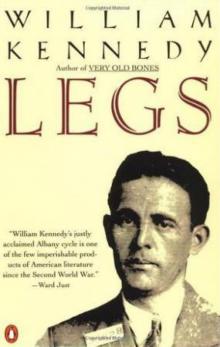 Legs - William Kennedy
Legs - William Kennedy